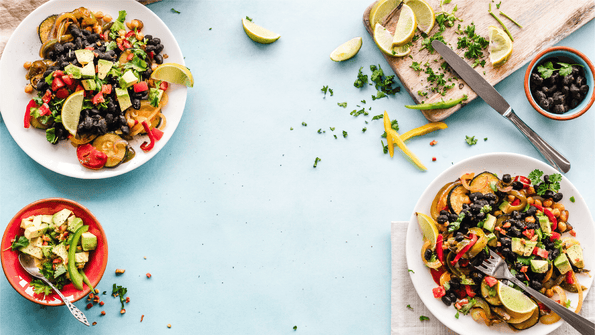Is your plant-based diet healthy?
Posted
Updated September 08, 2025

Posted
Updated September 08, 2025
-v1590707789931.jpg?4016x6016)

People across the globe are shifting towards more plants in their diets. Many are taking that one step further and eliminating animal products all together! Nearly 10% of all Canadians are following a vegetarian or vegan diet. Numbers are also rising in Europe and the US (1). With that said, how easy is it to maintain a healthy plant-based diet? The “vegan” label is commonly used as if it’s synonymous with “healthy”. We often discuss Vegan diets as if they are the magic pill for optimal health, but this is unfortunately not always true. There are some common mistakes in vegan diets, and a few important things to consider when it comes to maintaining a healthy plant-based diet.
What percentage of your food is coming from whole foods sources, and what percentage is processed? Processed food is not great for us for many reasons, whether it’s vegan or not. Because so many people mistakenly equate “vegan” with “healthy”, vegan processed foods are often treated differently than their conventional equivalents. This becomes especially important to consider with the advent of all the new vegan meat products: Tofurkey, Beyond Meat Burgers, plant-based chicken nuggets, etc. These meat replacement products are all highly processed, far removed from their original whole foods sources. They also contain preservatives and other chemicals that are a necessary component of the processing. These foods should all be eaten only in moderation, and should not be thought of as healthy, good sources of vegetables and other plant-based nutrients.
There are a few questions to ask yourself when thinking about your protein intake, whether you’re on a vegan diet or not.
Animal protein is significantly more bioavailable than plant-based protein. This means that humans can absorb much more of the protein contained in animal protein than in plant-based protein, for a variety of reasons (2). Humans can absorb almost 100% of the protein contained within animal products, and only 25-75% of the protein contained within plant-based protein (3). This doesn’t mean that plant-based protein is bad for you, but it does mean that you need to consume more of it to get the same amount of protein that animal products would provide.
The average recommendation for protein intake is a minimum of 1 g of protein per kg of body weight per day. However, the study that determined that number was using 100% animal protein. Taking into account the lower bioavailability of plant-based protein sources, that means that folks on vegan diets have an average protein requirement of 1.5 g of protein per kg of body weight per day. That number further increases if an individual is doing a lot of weight training or exercise in general, or is trying to actively heal from serious illness or injury (4).
If you are experiencing any of these symptoms, get assessed by a naturopathic doctor or nutritionist to make sure you are getting enough of the nutrients your body needs.
Even a well-balanced, whole foods-based, healthy plant-based diet will be deficient in some nutrients. This is due to some nutrients' low availability in sources other than animal products. Carefully chosen supplements are necessary to ensure optimal health on a vegan diet. Some individuals will need specific nutrients more than others. It’s important to check with your naturopathic doctor or nutritionist to determine which supplements would best serve you. The most common nutrient deficiencies in individuals on vegan diets are iron and B12. That is because they are found primarily in animal products. Also, the few plant-based sources that exist have very poor bioavailability. Blood levels of these two nutrients can be easily tested to determine what dose of supplement you require. Iron and B12 supplements should be taken ongoing. The omega 3s EPA and DHA are also a common deficiency in vegan diets, because they are found primarily in fish. Supplementation of these fatty acids should therefore be seriously considered. Other nutrients that are commonly deficient in vegan diets are zinc, calcium, riboflavin (vitamin B2) and vitamin D.
Want to save those furry little creatures, or just decrease your grocery bill, while still maintaining your health? It’s possible for most people, but it does require a little bit of extra work. But if you’re willing to put in that extra work, a healthy plant-based diet can actually be the magic diet for health that many people are looking for. Just make sure it contains a large amount of vegetables, fruits, healthy fats and plant-based protein, small amounts of processed foods, and the appropriate supplements.
-v1590707789931.jpg?4016x6016)
Dr. Jessica Eastman is a licensed and registered naturopathic doctor in clinical practice in Vancouver BC. She is an experienced faculty member at the Institute of Holistic Nutrition, and the founder of Thrive clinical mentorship. Jessica strongly believes in integrative medicine and the value of a supportive community.
Get expert-backed health tips, education, product news, and exclusive offers delivered to your inbox.
Follow @organikahealth for your daily dose of feel-good. #LiveOrganikally